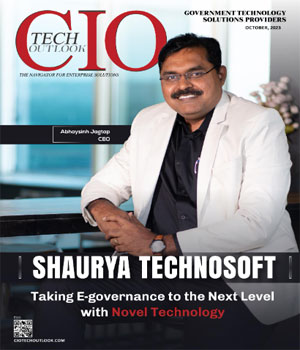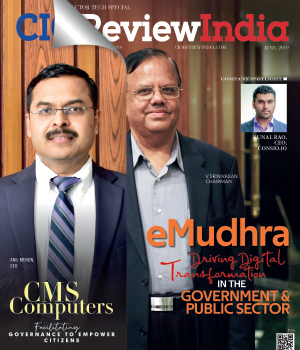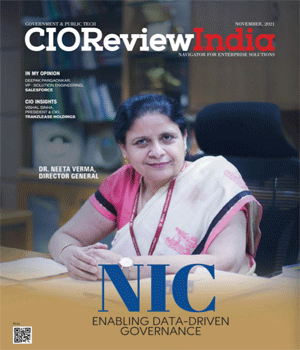
Smart Cards Continue To Expand Across Domains
By K. Srinivas Subramanyam, Solution Strategist and IT Architect, Kellton Tech Solutions Limited | Monday, 17 September 2018, 10:31 IST
 It is hard to believe that a 3X2 inch piece of plastic can have a dramatic impact on business. However, over the last few years, Smart Cards have done just that. The magical component is not just a piece of plastic but is the most powerful microchip that can perform a multitude of functions for a business. A lot of people might not know this, but smart cards have revolutionized the way we do things every day. Ever since they have been introduced, a number of industries have started using smart cards for various purposes.
It is hard to believe that a 3X2 inch piece of plastic can have a dramatic impact on business. However, over the last few years, Smart Cards have done just that. The magical component is not just a piece of plastic but is the most powerful microchip that can perform a multitude of functions for a business. A lot of people might not know this, but smart cards have revolutionized the way we do things every day. Ever since they have been introduced, a number of industries have started using smart cards for various purposes.
Changing the World with Smart Cards
Smart cards are small chip cards that store machine-readable data. They are embedded with microprocessors that help in carrying out smooth transactions. Smart cards are used in SIM cards, hotel key cards, credit cards, debit cards, and various other government IDs. Although they have been around for a long time, smart card solutions still have the potential to change the way we do things today. Features like secure technology, cost-effectiveness, usability, and data portability have enabled the smart card solutions to continue to expand across domains like Healthcare, Education, Banking, E-commerce, Telecommunication, Civil Supplies, and many more. Smart cards are the best partners in implementing any solution designed to mitigate a real-world problem.
The scope and advantage of using smart cards in the current Information and Broadcasting (I&B) industry are massive. In the I&B industry, entertainment is delivered via satellite/cable to the DVD player/cable box/ cable-enabled PC. The primary aim is to encrypt and decrypt home delivery of service per subscriber access via the smart card. The digital video broadcast systems have already adopted smart cards as electronic keys for protection.
India has seen a promising growth of all the smart card applications during the past few years. Smart card technology, in conjunction with Blockchain, Mobile communication, Biometrics, RFID, and POS continue to be implemented by the Central and the State governments of India for several socio-economic welfare projects, worth trillions of rupees.
Smart Card and the Promise of Technology Smart Card with Blockchain
It’s anticipated that a diverse set of applications will be implemented using Blockchain—from cryptocurrencies to funds transfers and asset registries. With all these implementations, proper management of cryptographic keys is critical. If the private/cryptographic keys are lost or stolen, any asset associated with Blockchain will be lost forever. Smart cards can be used to manage cryptographic keys. They can be used in conjunction with the Blockchain technology to enable convenient and secure transactions.
Smart Card with Biometrics
A smart card is a trusted source for authenticating an individual’s identity. Biometric template stored on the smart card is used to authenticate and perform comparison locally without requiring any connection to the database of biometric identifiers. Since all biometric matching takes place using templates, there is no need to store complete biometric data on the smart card.
The latest secure smart card microcontrollers provide sufficient on-card processing power and memory to perform the biometric match directly within the logic of the smart card instead of the reader device. These biometric match-on-card approaches provide a more private and secure identity verification system.
Smart Card in Network Security
In the enterprise and network security segment, Microsoft Windows, Sun Microsystems (a subsidiary of Oracle Corporation), and all new versions of Linux have built-in software hooks to deploy smart cards as a replacement for username and password. Microsoft has built a complete credential platform around the Scard DLL and Crypto Service Provider (CSP).
For enterprises using the Public Key Infrastructure (PKI) security, smart card badge is the new standard. Smart card badge combines powerful smart card technology with conventional inkjet printing to create a powerful smart card solution. Smart card solutions enhance the functionality of business-to-business Intranets and Virtual Private Networks (VPNs). They also ensure that the users are authenticated and authorized to access only specific information based on preset privileges.
Smart Cards—the All-in-one Solution
Smart card solutions are currently in the nascent stage with the potential to grow faster than needed. It links people to the Internet, enabling them to exchange data and access information in a more secure way to the server. The best thing about smart card technology is that it can easily go with all future technologies to become the right solution mix for a problem statement.
CIO Viewpoint
Smart Cards Continue To Expand Across Domains
By By K. Srinivas Subramanyam, Solution Strategist and IT Architect, Kellton Tech Solutions Limited
Strategies To Steer Government Bodies
By By Srikanth Karra, CIO, City of Birmingham
Time To Nurture A Digital Culture
By Apoorv Srivastava, Director Global Services CIO, BT
CXO Insights
The Vulnerability Of IOT Devices Looms Large On...
By Praveen Jaiswal, Co-Founder & Director, Vehere
AI-AS-A-Service, Big Data & RPA To Transform...
By Anil D'Souza, Founder & CEO, Simpliance Technologies
A 3-Pronged Framework To Ensure Smooth...




.jpg)






